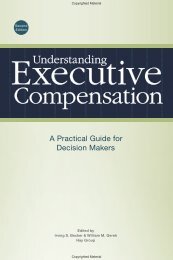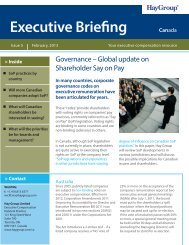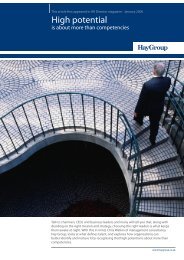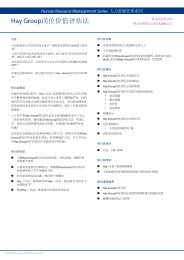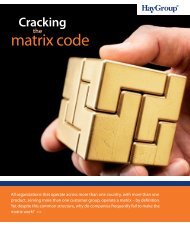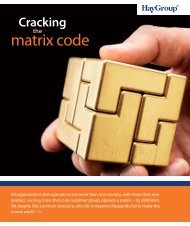Engage Employees and Boost Performance - Hay Group
Engage Employees and Boost Performance - Hay Group
Engage Employees and Boost Performance - Hay Group
You also want an ePaper? Increase the reach of your titles
YUMPU automatically turns print PDFs into web optimized ePapers that Google loves.
The more difficult challenge for<br />
companies is capturing the<br />
hearts <strong>and</strong> minds of good,<br />
reliable employees who are not<br />
stars but who are significantly<br />
more productive when engaged.<br />
2<br />
W O R K I N G<br />
PAPER<br />
“Patricks” (<strong>and</strong> “Patricias”) at every large private- or public-sector organization.<br />
Stars tend to be intrinsically motivated to begin with, plus they end up capturing<br />
most of the “prizes” companies offer — the most interesting work, big<br />
salary increases, promotions <strong>and</strong> bonuses. The more difficult challenge for<br />
companies is capturing the hearts <strong>and</strong> minds of good, reliable employees like<br />
Patrick who are not stars but who are significantly more productive when<br />
engaged.<br />
Research suggests many companies are not succeeding. A huge percentage of<br />
these “engine room” employees are disengaged. <strong>Hay</strong> Employee Attitude<br />
Surveys1 show that less than half of them feel they do interesting work. Just<br />
one-third feel they can advance, <strong>and</strong> only about the same percentage feel that<br />
better performance will lead to better pay.<br />
Figure 1: Difference in value-added discretionary performance<br />
between "superior" <strong>and</strong> "average" performers<br />
Type of Job<br />
Low-complexity jobs<br />
Moderate-complexity jobs<br />
High-complexity jobs<br />
Sales<br />
<strong>Performance</strong><br />
Difference<br />
19%<br />
32%<br />
48%<br />
48% - 120%<br />
Patrick’s new company did not lure him away with a substantially bigger salary.<br />
Nor did it use pay as a prime motivator once he arrived. Instead, it offered him<br />
a new psychological contract, one that successfully engaged him by letting him<br />
know that his contributions mattered. As a result, what mattered most to the<br />
company also mattered most to Patrick. The company’s reward: A 40 percent<br />
increase in Patrick’s <strong>and</strong> his team’s productivity.<br />
Your employees start every day with an extraordinary amount of energy, but<br />
the amount of “discretionary effort” that people apply to their jobs varies<br />
tremendously from employee to employee. One study showed that even in relatively<br />
simple jobs the difference in discretionary performance between superior<br />
<strong>and</strong> average workers was 19 percent (see Figure 1). 2 In complex jobs<br />
such as high-ticket industrial sales, the difference was as great as 120 percent.<br />
1 Based on data from <strong>Hay</strong> Insight’s employee opinion database, which contains survey responses<br />
obtained in the past four years from about one million employees at more than 330 companies.<br />
2 J.E. Hunter, F.L. Schmidt, <strong>and</strong> M.K. Judiesch,“Individual Differences in Output Variability as a<br />
Function of Job Complexity,” Journal of Applied Psychology 75: 28-42.




